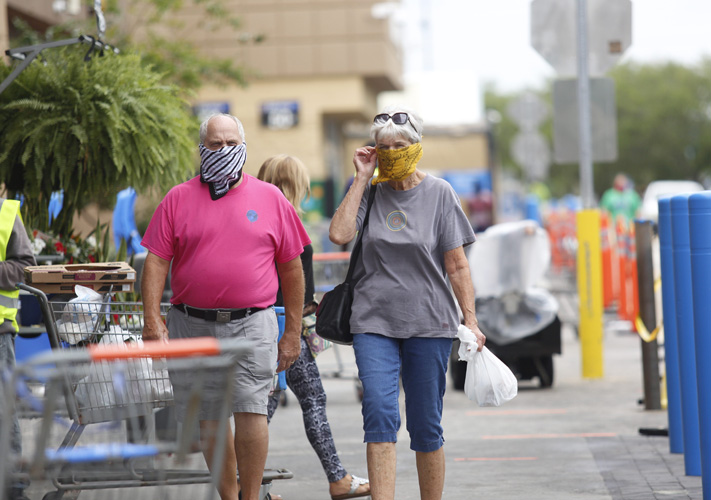
Masks – scarves, bandannas, home-crafted cloth masks, and even a few sturdy N95 respirators – were showing up everywhere in Vero this week after the Centers for Disease Control issued new guidance suggesting the use of face coverings to help slow the spread of COVID-19.
For months, Americans were told by medical experts, including the U.S. Surgeon General Jerome Adams, not to wear a face mask – that masks were “not effective” in protecting the general public. Then on Saturday, Dr. Adams’ advice changed.
“In light of new evidence, CDC recommends wearing cloth face coverings in public settings where other social distancing measures are difficult to maintain (grocery stores, pharmacies, etc.), especially in areas of significant community-based transmission,” Adams said.
Officials still don’t want the average person wearing medical-grade N95 masks because those continue to be in short supply for hospitals and first responders. Those masks are at this point hard to find and can be expensive due to price gouging.
But given the somewhat mixed message on masks, Vero Beach 32963 sought guidance from local healthcare professionals.
Indian River Shores Public Safety Capt. Albert Iovino, a paramedic and registered nurse with 14 years’ experience, said face masks are “just one more tool for keeping the virus from spreading,” but wanted to make sure residents don’t substitute a mask for other basic protective measures they’ve been taking the past few weeks.
“Even prior to the coronavirus, especially during flu season, you’d see a certain number of people out wearing a basic-type mask and taking that precaution, but you’d be amazed at the amount of prevention you can do by washing your hands after you’ve been out and keeping your hands off your face,” Iovino said.
New Vision ophthalmologist Dr. David O’Brien is not an infectious disease specialist, but he’s seen enough to tell his parents, ages 80 and 87, to wear a mask when they must go out for essential supplies.
“My mom and dad had to go out to the Stop and Shop on Long Island where I grew up and they were both wearing masks and they were grateful for the other people they saw who were wearing masks,” he said.
O’Brien’s daughter, who travels extensively for work, has been wearing a mask for months now. She’s found it has the added benefit of people keeping their distance on flights and in airports.
“I wear a mask when I need to fly, and I definitely recommend anyone wear a mask when they have to travel by plane, bus or on the subway,” said O’Brien, 57, who completed part of his medical residency at St. Vincent’s Hospital in Manhattan, where he saw a multitude of rare and deadly communicable diseases ravage his immunocompromised patients during the height of the HIV/AIDS epidemic. He also trained in India amid third-world conditions, with rampant overcrowding and infectious diseases.
Those scenarios in which O’Brien trained required strict measures for infection control. But what about, say, going out to a Publix store in Vero Beach?
Wearing a mask to the grocery store or the post office is a good idea for everyone who feels safer wearing a mask, O’Brien said, or for anyone who is feeling under the weather with seasonal allergies, or who wants to make sure they don’t infect anyone if they are a carrier of the virus but are not having any symptoms.
“It’s great if it gives you a little peace of mind,” he said. “I would recommend it, especially if it stops them from touching their face.”
An N95 mask is a particle filter designed to keep out 95 percent of particles like respiratory droplets, but this type of mask can be uncomfortable to wear and can make breathing more laborious.
The cloth masks being recommended for the average citizen provide a physical barrier but, unlike disposable N95 and one-time use surgical masks, a cloth mask can be washed in between uses.
For anyone who is even minimally crafty, the CDC website www.cdc.gov has patterns and instructions for crafting a homespun mask. There’s even a no-sew pattern made of an old T-shirt and rubber bands or elastic hair ties, so no need to go out to gather special fabric or supplies. Some patterns insert a cut-up coffee filter to add another layer to thinner material.
Masks protect the mouth and nose, and limit how far a person can project the virus when breathing, coughing or sneezing, but O’Brien said people also need to be mindful of their eyes when it comes to preventing infection from the new coronavirus.
He said it’s believed that the conjunctiva – the blood-rich lining of the eyelid – is a point in the body where the virus can enter. He said this is the way pollen and other allergens get in to cause allergic reactions.
“If you wear glasses, wear them instead of wearing your contacts because you get some protection from wearing glasses,” O’Brien said. “And you can use preservative-free artificial tears to help wash out the eye area.”



